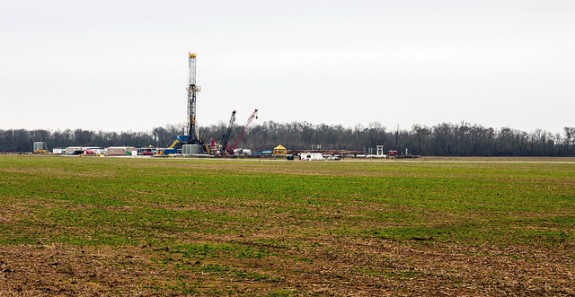
The Florida House is expected to pass a fracking bill today, which environmental groups warn will open the state to natural gas drilling. (Photo by Daniel Foster.)
By Ashley Lopez
Florida Center for Investigative Reporting
One of four bills dealing with natural gas drilling and storage in Florida is expected to pass in the Florida House today. The bill would put chemical disclosure rules in place for hydraulic fracturing in the state, but environmentalists say it would also open the state to harmful natural gas drilling.
Hydraulic fracturing, popularly known as fracking, is a way to mine for natural gas stored underground by breaking up rock formations with highly pressurized water and chemicals. Once these rock formations, typically shale, are cracked open, natural gas is released and stored.
Pennsylvania and Texas have allowed fracking for years. It’s a booming industry that has created a lot of jobs and made the United States more energy independent — but fracking has come with environmental costs. Communities and homes near fracking sites have reported earthquakes and polluted groundwater.
An investigation by The New York Times found that as fracking has increased in the country, water pollution has as well:
With hydrofracking, a well can produce over a million gallons of wastewater that is often laced with highly corrosive salts, carcinogens like benzene and radioactive elements like radium, all of which can occur naturally thousands of feet underground. Other carcinogenic materials can be added to the wastewater by the chemicals used in the hydrofracking itself.
While the existence of the toxic wastes has been reported, thousands of internal documents obtained by The New York Times from the Environmental Protection Agency, state regulators and drillers show that the dangers to the environment and health are greater than previously understood.
The documents reveal that the wastewater, which is sometimes hauled to sewage plants not designed to treat it and then discharged into rivers that supply drinking water, contains radioactivity at levels higher than previously known, and far higher than the level that federal regulators say is safe for these treatment plants to handle.
That’s why there is a growing trend for states to put rules in place that require oil and gas companies to disclose the chemicals they are using, because sometimes those chemicals end up in the groundwater.
Such a law is soon to pass in the Florida House. However, the bill — sponsored by state Rep. Ray Rodrigues, R-Estero — does not have support from environmental groups.
Environmentalists initially opposed the measure, arguing it was a ploy to open the state to a process they claim could be disruptive to Florida’s fragile aquifers and high water table. But amendments adopted by the House have appeased them, said Mary Jane Yon, lobbyist for Audubon of Florida.
The change requires that companies disclose not only chemicals used in the fracturing process but disclose the chemical concentration by mass and the chemicals used for each well. Chemicals make up about .5 percent of the fracking compounds, with 95 percent of it water and 4.5 percent sand, Rodriques said.
Yon said another related bill, HB 745, is more troubling because it would exempt from public records any “trade secrets” companies can claim about proprietary chemicals.
“We are fully behind the spirit of sharing information with the public, but we worry if you are allowed to call everything a trade secret we have nothing left to share,’’ Yon said.
Oil and gas industry representatives support the disclosure requirements.
Rodrigues’ two bills are among four aimed at establishing rules for natural gas drilling.
Another bill sponsored by state Rep. Dane Eagle, R-Cape Coral, would set up laws for underground natural gas drilling and an environmental regulation bill in the House would speed up the permitting process for building natural gas pipelines through the state.
As I reported for WGCU, environmentalists are closely watching these bills. Yon, representing Audubon of Florida, said it’s a sign of things to come, as well as an open invitation for any company looking to frack in Florida:
Yon said if all four bills pass the state would have a regulatory framework ripe for fracking in Florida.
“It’s not worth the risk to our environment to have that political invitation out there,” she said.
For right now, geologists have said Florida is an unlikely place for fracking. They said the state’s geology just isn’t ideal.
The Florida Petroleum Council’s Mica, however, said these laws should be in place anyway.
“You know, I think a preparation type of activity like this to put a system in place should we develop the types of technology that lends itself to the geology of southwest Florida would certainly be appropriate,” he said.
Companies have so far shown interest in drilling in Southwest Florida’s Lower Sunniland Trend and the Jay field in the Panhandle. Geologists believe the Panhandle would be the most viable site for fracking in Florida.
